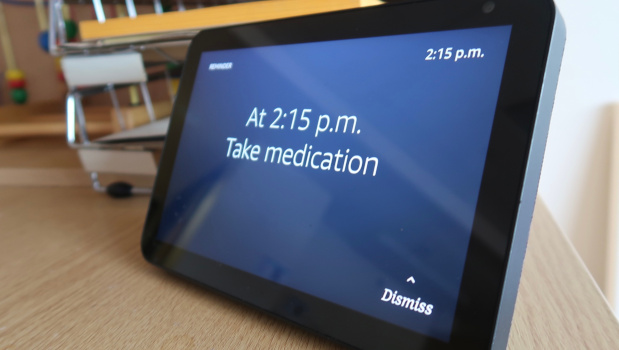
DCU trials independent living tech in Dublin homes
The Nex Project, a system which aims to support older adults living independently, has entered its final phase of trials and is being installed in homes across Dublin.
The system is made up of several technological devices including sensors, voice-activated assistants, wearable devices, and smart plugs.
These devices collect the user’s data which is monitored remotely in order to understand a pattern of behaviour.
“People actually tend to be very patterned in their lives, even those who think we are not,” said Dr Catriona Murphy, principal investigator of the DCU Centre for eIntegrated Care team.
The aim of the project is to find technological solutions to enable older adults to live for as long as possible in their own homes and to support caregivers in caring for their family members or patients in a non-intrusive manner.
Sensors installed in the home measure motion, temperature, humidity, vibration, illumination and UV index and track how these factors change throughout the day.
Motion sensors are placed above doors to track the time a person leaves and enters their home.
“They go out every day, go shopping and then over a period of maybe six months, you might notice the person going out less and less and for a shorter time or not going out at all… You start to see patterns,” Dr Murphy said.
In order to further capture a person’s normal routine these sensors are also placed on kitchen cupboards, fridges, drawers and wardrobes.
An alarm can be set to notify an outside care team or family member if there is a sudden change in activity patterns.
“If there’s someone who’s always in bed at nine o’clock, and who would never be out after midnight, then you could set an alert if the door opens between midnight and six,” Dr Murphy said.
The scheme may potentially be used by home care companies and family members in the future to care for older adults without the need to invade their space.
The system’s target demographic are those at the early stages of receiving a form of home care.
“Some people love the contact of people calling and then other people find that quite disruptive, they don’t really like having carers come in and they prefer to interact with a remote system,” Dr Murphy said.
Wearable devices are worn by the user to monitor their sleep pattern, activity levels and the number of steps they do each day.
Interruptions to activity or sleep cycles can be a sign of underlying illness or infection and this data would be included as part of an overall health assessment. “It could be something that would be commercially available in the future or partly funded to provide it in home and data could be extracted for homecare companies or homecare teams,” Dr Murphy said.
A woman in her late 80s, who trialled the system last year, found the pedometer function to be quite motivating and was unaware of the amount of activity she managed to do during the day.
“She was feeding birds at the end of her garden, and she said to go up and down to fill the trays a few times a day, she was really surprised at how much steps that [added],” Dr Murphy said.
The population of Ireland is rapidly aging and the number of people over the age of 65 is set to double by 2050, which according to Dr Murphy, will have a “tremendous” effect on society.
“It is really important that as much as possible is done now for the future, that we’re making sure that people stay engaged, stay participating in society,” she said.
During earlier trials, the Amazon Echo was found to be a particularly valuable tool in assisting in everyday life and was used to set reminders to take medication and attend appointments, read recipes, set timers and for video calling.
The system is designed so that it can be fully customized to suit individual needs, with one respondent saying: “I can’t wear a Fitbit because I have arthritis in my wrists.”
User data is protected through in-built security within the system and no cameras are used to monitor activity, which was a concern for some respondents.
The system was trialled initially last year during the pandemic where the different technologies needed to be self-installed, which led to one participant dropping out of the programme.
Due to the easing of restrictions, designated technicians are now available to go into homes and assess the user’s space and participants now have access to these technicians if they have any issues.
The Nex project, funded by Enterprise Ireland is a collaboration between the Centre for eIntegrated Care and Insight SFI Research Centre for Data Analytics at Dublin City University and industry partners Davra and Danalto.
Claire Young





Subscribers 0
Fans 0
Followers 0
Followers